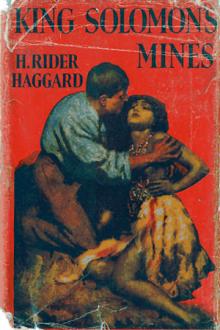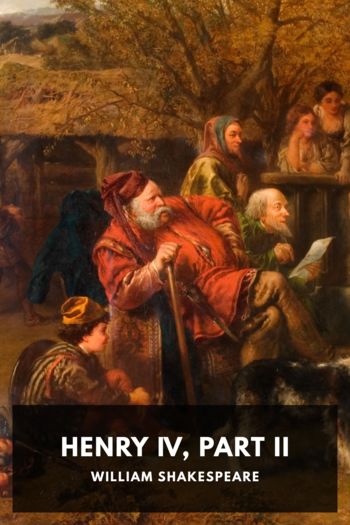King Solomon’s Mines, H. Rider Haggard [best mystery novels of all time TXT] 📗

- Author: H. Rider Haggard
Book online «King Solomon’s Mines, H. Rider Haggard [best mystery novels of all time TXT] 📗». Author H. Rider Haggard
Sir Henry, Good, and Umbopa by this time had seized their rifles and lifted them threateningly. The party of natives still came on. It struck me that they could not know what rifles were, or they would not have treated them with such contempt.
“Put down your guns!” I halloed to the others, seeing that our only chance of safety lay in conciliation. They obeyed, and walking to the front I addressed the elderly man who had checked the youth.
“Greeting,” I said in Zulu, not knowing what language to use. To my surprise I was understood.
“Greeting,” answered the old man, not, indeed, in the same tongue, but in a dialect so closely allied to it that neither Umbopa nor myself had any difficulty in understanding him. Indeed, as we afterwards found out, the language spoken by this people is an old-fashioned form of the Zulu tongue, bearing about the same relationship to it that the English of Chaucer does to the English of the nineteenth century.
“Whence come you?” he went on, “who are you? and why are the faces of three of you white, and the face of the fourth as the face of our mother’s sons?” and he pointed to Umbopa. I looked at Umbopa as he said it, and it flashed across me that he was right. The face of Umbopa was like the faces of the men before me, and so was his great form like their forms. But I had not time to reflect on this coincidence.
“We are strangers, and come in peace,” I answered, speaking very slowly, so that he might understand me, “and this man is our servant.”
“You lie,” he answered; “no strangers can cross the mountains where all things perish. But what do your lies matter?—if ye are strangers then ye must die, for no strangers may live in the land of the Kukuanas. It is the king’s law. Prepare then to die, O strangers!”
I was slightly staggered at this, more especially as I saw the hands of some of the men steal down to their sides, where hung on each what looked to me like a large and heavy knife.
“What does that beggar say?” asked Good.
“He says we are going to be killed,” I answered grimly.
“Oh, Lord!” groaned Good; and, as was his way when perplexed, he put his hand to his false teeth, dragging the top set down and allowing them to fly back to his jaw with a snap. It was a most fortunate move, for next second the dignified crowd of Kukuanas uttered a simultaneous yell of horror, and bolted back some yards.
“What’s up?” said I.
“It’s his teeth,” whispered Sir Henry excitedly. “He moved them. Take them out, Good, take them out!”
He obeyed, slipping the set into the sleeve of his flannel shirt.
In another second curiosity had overcome fear, and the men advanced slowly. Apparently they had now forgotten their amiable intention of killing us.
“How is it, O strangers,” asked the old man solemnly, “that this fat man (pointing to Good, who was clad in nothing but boots and a flannel shirt, and had only half finished his shaving), whose body is clothed, and whose legs are bare, who grows hair on one side of his sickly face and not on the other, and who wears one shining and transparent eye—how is it, I ask, that he has teeth which move of themselves, coming away from the jaws and returning of their own will?”
“Open your mouth,” I said to Good, who promptly curled up his lips and grinned at the old gentleman like an angry dog, revealing to his astonished gaze two thin red lines of gum as utterly innocent of ivories as a newborn elephant. The audience gasped.
“Where are his teeth?” they shouted; “with our eyes we saw them.”
Turning his head slowly and with a gesture of ineffable contempt, Good swept his hand across his mouth. Then he grinned again, and lo, there were two rows of lovely teeth.
Now the young man who had flung the knife threw himself down on the grass and gave vent to a prolonged howl of terror; and as for the old gentleman, his knees knocked together with fear.
“I see that ye are spirits,” he said falteringly; “did ever man born of woman have hair on one side of his face and not on the other, or a round and transparent eye, or teeth which moved and melted away and grew again? Pardon us, O my lords.”
Here was luck indeed, and, needless to say, I jumped at the chance.
“It is granted,” I said with an imperial smile. “Nay, ye shall know the truth. We come from another world, though we are men such as ye; we come,” I went on, “from the biggest star that shines at night.”
“Oh! oh!” groaned the chorus of astonished aborigines.
“Yes,” I went on, “we do, indeed”; and again I smiled benignly, as I uttered that amazing lie. “We come to stay with you a little while, and to bless you by our sojourn. Ye will see, O friends, that I have prepared myself for this visit by the learning of your language.”
“It is so, it is so,” said the chorus.
“Only, my lord,” put in the old gentleman, “thou hast learnt it very badly.”
I cast an indignant glance at him, and he quailed.
“Now friends,” I continued, “ye might think that after so long a journey we should find it in our hearts to avenge such a reception, mayhap to strike cold in death the imperious hand that—that, in short—threw a knife at the head of him whose teeth come and go.”
“Spare him, my lords,” said the old man in supplication; “he is the king’s son, and I am his uncle. If anything befalls him his blood will be required at my hands.”
“Yes, that is certainly so,” put in the young man with great emphasis.
“Ye may perhaps doubt our power to





Comments (0)